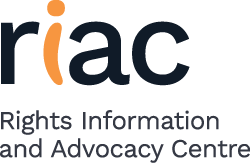A SNAPSHOT OF THE TYPE OF ASSISTANCE AN ADVOCATE PROVIDES
Case study 1
This advocacy issue is about an adult with an intellectual disability, having a Facebook page constructed under his name. He had no technical know-how and does not have a mobile phone.
The page was constructed by teenagers poking fun and having a laugh at his expense, he had over 250 people as friends, whom he did not know and there were inappropriate comments posted. Meanwhile, his home was also being egged and teenage kids were being encouraged to tease and yell out horrible things as they went past his house. The local police were aware of the situation and made a point of doing extra drive-bys past his home.
RIAC advocacy was sought.
Contact was made to Facebook by the advocate, but the Facebook details did not match the details provided by the advocate, in particular his birthdate and there were no photos attached to official documents that could identify him such as a license, this made it difficult because he had no photo identification.
Contact was made to ID Care, Australia and New Zealand’s national identity and cyber support service. IDCARE offers free phone consultations and advice from specialised identity and cyber security counsellors. ID Care couldn’t assist in this matter but after much discussion they agreed the next step was to give the E-safety commission a call.
Prior to calling the E-Safety commission, there was also discussion with the Australian Federal Police about trying to identify the people who were doing this and to notify them of this situation.
There were constant back and forth emails with Facebook, but this was not helping and not getting us anywhere, so once contact and information was provided to the E-safety commission they were able to step in and take down the Facebook page within a day or so.
This entire matter was very stressful and demeaning to the gentleman involved.
Case study 2
Client’s household electricity and gas were cut off by their neighbour after him accessing their mail. Concerns and complaint were raised to the electricity company by the client but not taken seriously. There was no transparency about what actions the electricity company took once they knew of this situation.
RIAC advocacy was sought to assist because the person didn’t know what to do and their mental health and disability was preventing them from getting any answers themselves. Advocate contacted the electrical company, no adequate response was given so an official complaint was submitted, response to this complaint from the electricity company was unsatisfactory.
Issued complaint to Energy and Water Ombudsman Victoria, still no positive outcome.
Contacted Consumer Action Law Centre for advice and information. Helpful but unable to take on case due to high demand and no capacity.
Advocate issued a complaint to the Office of the Australian Information Commission (OIAC) due to privacy concerns – required to wait more than 9 months due to high demand of OAIC services, we waited.
Conciliation conference held by OAIC which discussed issues raised about privacy, stolen identification.
Successful outcome was reached, debt was waived, compensation was paid to the client for the stress and anxiety caused and the electricity company said they would ensure better communication in the future. The company also identified their processes were inadequate and need to be more user friendly for people with mental health issues and disabilities – adaptations were being investigated and planned.
Case study 3
Communication for NDIS participant was not very good with the Local Area Coordinator, despite many attempts to improve this themselves.
RIAC Advocacy sought to assist with a complaint. Request was made for another LAC. This request was granted. Participant and new LAC working well.
